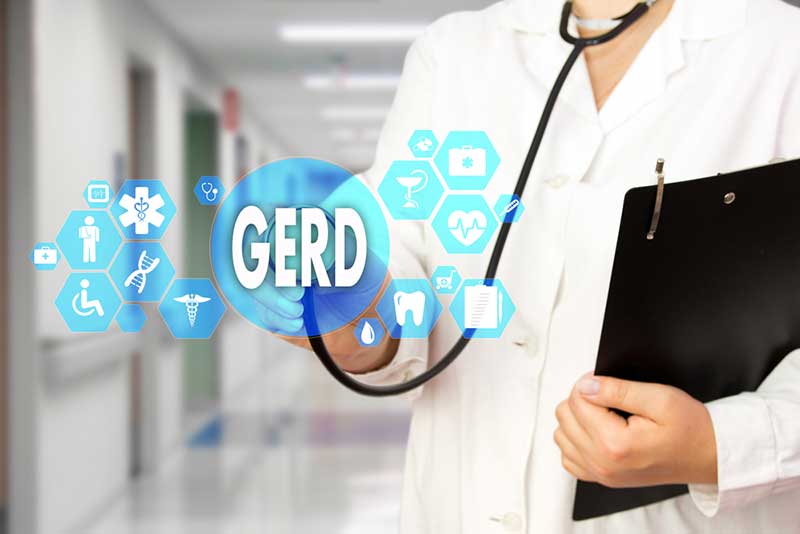If you experience a burning sensation or bitter taste in your mouth after eating a large meal, you may have GERD (gastroesophageal reflux disease). It’s a disorder that impacts the digestive system and is the result of an esophageal muscle malfunction.
What Causes GERD?
GERD is a more serious, chronic version of acid reflux that develops when part of the esophagus becomes weak or stops working properly. Normally, a ring-shaped valve creates a seal that separates the stomach contents from the esophagus, keeping the stomach contents from back flowing or refluxing. When food or beverages are consumed, the muscular valve opens up to allow the contents to travel downward into the stomach by way of the digestive tract.
If you experience heartburn or acid reflux at least twice a week you may have GERD and can benefit from seeing a doctor for a formal diagnosis and treatment.
Conservative Treatments for GERD
The problem with not having acid reflux properly diagnosed or forgoing treatment for gastroesophageal reflux disease is that eventually, it can lead to serious inflammation and scarring of the esophagus and throat. In fact, GERD can be progressive and advanced, untreated GERD has been linked to esophageal cancer.
Many people try out to conservative tactics to help manage their GERD symptoms. Even those who opt for medical care can benefit from making the following improvements in their lifestyle.
Modify diet: Certain foods and recreational items are acid reflux and GERD triggers. Keep a food diary and track all foods and beverages consumed before symptom flare-ups. Take note of the offending foods and eliminate them from the diet. Common offenders are spicy, rich, citrusy, and fatty foods, as well as alcohol and nicotine products.
Lose weight and exercise: Obesity is the main contributor to GERD in many adults. Maintaining a healthy weight is crucial to reduce the pain and discomfort associated with GERD.
Avoid eating before lying down: GERD occurs when the contents in the stomach force their way up. Prone and other body positions make it easier for this to happen. Avoid the prone position after eating, especially with a full stomach.
Sleep while elevated: Some people find it beneficial to sleep at an incline where the head of their bed is elevated at least four to six inches to keep their symptoms from flaring.
Take antacids/PPIs: Proton pump inhibitors reduce gastric acid production and activity to help reduce acid reflux and GERD symptoms. PPIs are ideal for those who have heartburn that doesn’t respond to antacids or H2 blockers. Antacids neutralize stomach acid to help prevent heartburn and reflux.
The Dangers of Long-Term PPI Use
Taking proton pump inhibitors for longer than a couple of weeks can lead to difficulties and additional health symptoms that may require immediate medical attention. Symptoms of long-term use include constipation, stomach pain, ulcers, elevated gastric pH, fever, flatulence, diarrhea, nausea, osteoporosis, pneumonia, stroke, and life-threatening conditions. You should talk to your doctor before taking any over-the-counter medications or remedies for acid reflux or GERD.
Sometimes self-care, lifestyle management, and over-the-counter medications are not enough to keep mild acid reflux or gastroesophageal reflux disease symptoms from occurring. Prescription medications and surgical treatments are available that can help treat the symptoms and reduce most of the discomfort associated with these conditions.
TIF Surgery: A Permanent Cure for GERD
Thanks to advances in medical technology and practices, there is now an incisionless procedure for gastroesophageal reflux disease. The procedure is so safe and effective that it’s a permanent solution for anyone wanting relief from chronic heartburn or acid reflux disease.
TIF, or transoral incisionless fundoplication, is a safe and minimally invasive treatment for acid reflux, heartburn, and GERD. It’s a quick yet highly effective procedure that is done on an outpatient basis. The entire procedure is performed without any incisions. Patients can go home right after a brief stint in the recovery area before discharge home. There’s also very little downtime. Patients often resume most of their normal activities the following day. Results provide long-lasting relief for acid reflux, heartburn and GERD symptoms.
Benefits of TIF Surgery for GERD
The thought of surgery may seem unpleasant for treating a condition like GERD. That’s why it’s important to consider the benefits and how they outweigh the risks of treatment. There’s also the impact on your quality of life.
TIF surgery is FDA-approved and highly effective at curing GERD. Not only do patients get to put an end to their GERD symptoms, but they also reap the following benefits:
- No bloating or flatulence so there’s no need to worry about embarrassing or noxious odors or sounds.
- Fast recovery because there are no incisions or implants.
- Covered by most health insurers to help prevent delays in care and facilitate faster treatment and relief.
- Minimally invasive because there are no incisions or metal implants so there’s less trauma and surgical invasiveness.
- Eliminates the effects and risks of traditional surgery.
Who Is TIF Surgery Right for?
As appealing as TIF surgery seems, it is not right for everyone. Suitable candidates are those who have had limited to no success managing their GERD symptoms with lifestyle changes, proton pump inhibitors, and remedies. Also, individuals who are interested in surgical treatment options but are wary of conventional options can benefit from TIF surgery.
If you experience frequent, yet unmanageable episodes of acid reflux or heartburn that stop responding to antacids or PPIs or are worried about the dangers of long-term proton pump inhibitor use, you may be a good candidate for transoral incisionless fundoplication treatment.
Ready to Learn More?
Coast Plaza Hospital provides advanced care and treatments for a wide variety of digestive and Gastroenterological conditions so patients can live their lives on their terms.
To learn suitable treatment options for your condition or for more information about TIF surgery, call (562) 868-3751 ext. 3031 to make an appointment with a gastroenterologist who specializes in GERD.

